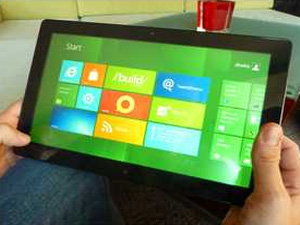



Date:20/04/12
 A new report from analyst first TechMarketView predicts that by 2016, 9.5 million employees in the UK – about one-third of the workforce – will be using their own computing devices for work, as the trend dubbed "bring your own technology" (BYOT) gathers pace.
A new report from analyst first TechMarketView predicts that by 2016, 9.5 million employees in the UK – about one-third of the workforce – will be using their own computing devices for work, as the trend dubbed "bring your own technology" (BYOT) gathers pace.
When computers first became mass-market items, companies typically paid thousands to put the fastest and most powerful PCs on staff desks. Today, the PCs on employees' desks are typically the cheapest money can buy, while staff buy very much better IT for themselves – fast quad-core PCs, smartphones and Android or Apple tablets.
And more and more are using their personal devices for business use.The report, entitled "BYOT: Opportunities and Threats from Disruption", warns that this will have an increasingly disruptive effect on corporate IT and computing markets.
"BYOT will create compelling opportunities for consulting, integration and software implementation, as companies try to navigate security and management issues, whilst significant downward pressure will be applied to support and hardware suppliers where personal devices replace centrally-owned kit," said Phil Codling, TechMarketView research director and the author of the report.
BYOT-related spending on software and IT services will total about £2bn between 2012 and 2016. In particular, said Codling, suppliers can help in terms of the security and management aspects of BYOT, although it also represents a threat to corporate hardware suppliers.
"Regardless of the potential opportunity on offer for software and IT services suppliers to provide advice and auditing as businesses transition to BYOT, the threat to desktop and mobile hardware suppliers is undeniable and suppliers need to find new business models and revenue drivers to counter this," said Codling.
Codling added: "The BYOT trend is a double-edged sword – while rapid and sustained adoption will lead to a £2bn opportunity for the UK IT market, it will be a huge disruptor to supplier partnerships and business models."
Bring your own device-related spending to top £2bn by 2016
 A new report from analyst first TechMarketView predicts that by 2016, 9.5 million employees in the UK – about one-third of the workforce – will be using their own computing devices for work, as the trend dubbed "bring your own technology" (BYOT) gathers pace.
A new report from analyst first TechMarketView predicts that by 2016, 9.5 million employees in the UK – about one-third of the workforce – will be using their own computing devices for work, as the trend dubbed "bring your own technology" (BYOT) gathers pace.When computers first became mass-market items, companies typically paid thousands to put the fastest and most powerful PCs on staff desks. Today, the PCs on employees' desks are typically the cheapest money can buy, while staff buy very much better IT for themselves – fast quad-core PCs, smartphones and Android or Apple tablets.
And more and more are using their personal devices for business use.The report, entitled "BYOT: Opportunities and Threats from Disruption", warns that this will have an increasingly disruptive effect on corporate IT and computing markets.
"BYOT will create compelling opportunities for consulting, integration and software implementation, as companies try to navigate security and management issues, whilst significant downward pressure will be applied to support and hardware suppliers where personal devices replace centrally-owned kit," said Phil Codling, TechMarketView research director and the author of the report.
BYOT-related spending on software and IT services will total about £2bn between 2012 and 2016. In particular, said Codling, suppliers can help in terms of the security and management aspects of BYOT, although it also represents a threat to corporate hardware suppliers.
"Regardless of the potential opportunity on offer for software and IT services suppliers to provide advice and auditing as businesses transition to BYOT, the threat to desktop and mobile hardware suppliers is undeniable and suppliers need to find new business models and revenue drivers to counter this," said Codling.
Codling added: "The BYOT trend is a double-edged sword – while rapid and sustained adoption will lead to a £2bn opportunity for the UK IT market, it will be a huge disruptor to supplier partnerships and business models."
Views: 1130
©ictnews.az. All rights reserved.Similar news
- Mobile operators of national market to reduce roaming tariffs
- Iran vows to unplug Internet
- China Targeting Telecoms in Corruption Probe
- Bangladesh to use electronic voting system for next elections
- Philippine IT sector to launch five-year digital strategy plan
- Russian Premier Vladimir Putin meets ITU Secretary-General Hamadoun Touré
- US lawmakers propose to regulate use of geolocation data
- Unlimited mobile data plans dying as telcos gear up for cloud future
- Europe at risk of falling behind US and Asia on 4G use
- Netherlands first to regulate on net neutrality
- Korean Co Takes Aim At Display Patents
- Regulators, Banks Look for IT Hires After Breakdowns
- Electron transactions spreading
- Schools in remote rural areas will connect to the single database via network without SIM
- Obama to Personally Tweet From Twitter Account





















